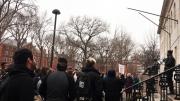During his first days in office, newly inaugurated President Donald J. Trump reinstated a Reagan-era policy banning United States foreign aid to healthcare entities that educate women about abortion services, and also signed an executive order as a first step to dismantling the Affordable Care Act. Yesterday, in their first few hours back on campus for the spring semester, a group of Harvard students rallied in the Yard despite snow, rain, and chilling winds. Their goal: to resist the new administration by presenting a letter of demands to President Drew Faust.
Representatives from eight student organizations—including Divest Harvard, the group advocating University divestment from endowment investments in fossil-fuel producers; the Harvard Islamic Society; and Act on a Dream, an advocacy group for undocumented students—took turns reading their demands to a steadily growing crowd of student protestors. Many organizers cited their own experiences as members of marginalized communities, and praised peer academic institutions that have declared themselves “sanctuary campuses” in response to Trump’s anti-immigrant rhetoric. Each speaker came back to the same message: that the post-election political climate is a critical opportunity for Harvard to act as a leader on inclusivity and equality.
Divest Harvard renewed its call for the University to “reinvest in socially responsible funds and freeze any new investments in fossil fuel companies,” as well as to “advocate for U.S. participation in the Paris climate accords.” Other demands included the creation of an ethnic studies department and ensuring that Harvard will not cooperate with national efforts that target Muslim students or workers. An organizer from the Student Labor Action Movement (SLAM) recalled the Harvard dining-hall workers’ strike last fall, which helped workers win summer stipends and the right to retain their healthcare plan for the next two years. In a statement following the protest, University spokesperson Melodie Jackson wrote, “The University has taken many steps toward these goals and we remain fully committed to working with all members of our community to advance them.”
Just last month, President Faust said that Harvard would not call itself a sanctuary campus, sparking dissent from some students. In a message to the Harvard community in November, Faust pledged not to voluntarily share information about students’ immigration status, and to devote additional resources for undocumented students.
For many of the organizers, the protest was a continuation of years-long campaigns. Last April, several Divest Harvard members were arrested during a sit-in at the Boston Federal Reserve in protest of the Harvard Management Company’s investments in the fossil-fuel industry—the latest in a string of protests during the past several years.
Protesters maintained that their demands are not exhaustive, and that they will continue to pressure the Harvard administration to actively resist what they characterized as the Trump administration’s attacks on women, Muslims, African Americans, and undocumented immigrants. In an email, Naima Drecker-Waxman, a coordinator for Divest Harvard wrote, “We will continue to act to hold Harvard accountable, both in our individual campaigns and when we come together.”









